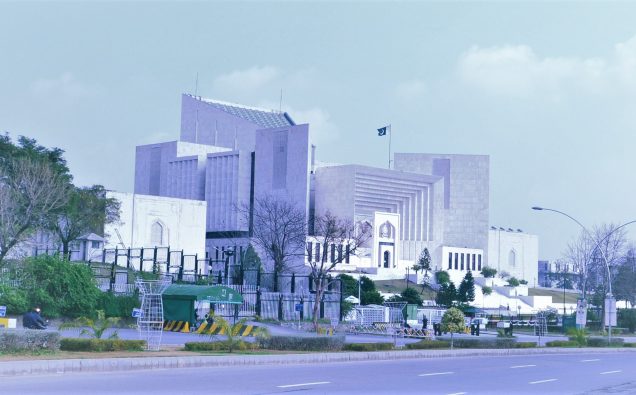
Supreme Court building in Islamabad, Photo: Khalid Mahmood/Wikimedia
In a rare instance in Pakistan’s constitutional and judicial history, Prime Minister Nawaz Sharif will appear before an investigating team as part of the Supreme Court’s probe into money laundering allegations against the Sharif family.
The occasion, in a way, is reflective of democracy maturing in the country but still powerful families, particularly in the two largest parties, Sharif’s PML(N) and Pakistan Peoples’ Party, as well as the military continue to have oversize influences.
However, it is the judiciary that appears to have had much greater say since the launch of the Panamagate scandal probe that asks the apex court to look into the Sharif’s ownership of London flats through undeclared and secret offshoring of their wealth.
There is a high-drama tension gripping the nation around the corruption scandal that has consumed unprecedented media attention.
During his second stint as prime minister, Sharif appeared before the Supreme Court in November 1997 in a contempt of case but this gesture was marred by mayhem by the workers of Muslim League within the premises of the apex court.
Ex-Prime Minister Syed Yousaf Raza Gilani also appeared before the Supreme Court in 2012 and the conviction by the court led to his ouster in June 2012. His successor, Raja Pervez Asharf also made an appearance before the court during his tenure as Prime Minister in Rental Power Plant case.
The summons for Prime Minister Sharif to appear before the committee, were issued by the Joint Investigation Team on June 8, 2017.
The prime minister will be probed by the JIT on Thursday, June 15, 2017 at 1100 hours, at the office of the JIT in Islamabad’s Federal Judicial Academy.
The JIT’s summons also reminded the PM to “bring along relevant record/documents/material” related to the Panama Papers case. This will entail nearly all the documents and evidence submitted before the Supreme Court by the PM’s counsel, Makhdoom Ali Khan.
According to media reports, Finance Minister Ishaq Dar may also be questioned by the team before the PM’s appearance.
In a judgement of April 20 in the Panama Papers case, the Supreme Court had constituted a JIT and empowered it to summon the prime minister, his sons and any other person necessary, to investigate allegations of money-laundering, through which the four apartments in London’s Park Lane area were purchased.
So far, the JT has called about a dozen witnesses, including a number of people, who Finance Minister Dar, a longtime loyal of the Sharifs, named in his “forced” confession in a money-laundering case, recorded by the National Accountability Bureau (NAB) in 2000.
But since then, Dar has backed out of the statement, saying it was recorded under duress.
The prime minister’s sons have also appeared before the powerful committee while the PML (N) and Sharif’s friends who have appeared before the team have alleged disrespecting treatment.

















